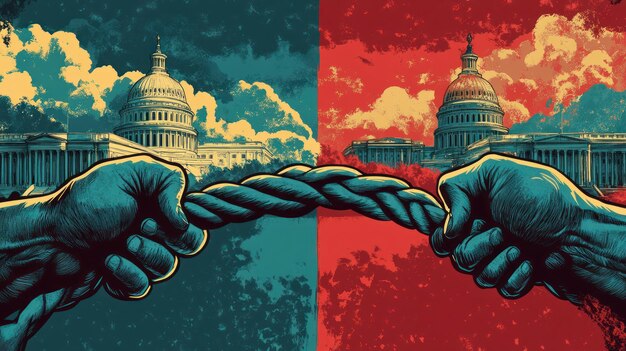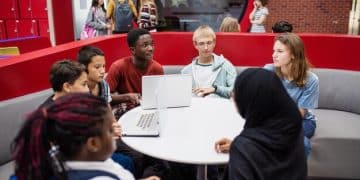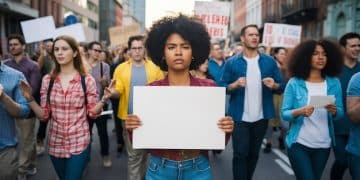Political Polarization in America: Analyzing the Divide and Finding Common Ground

Analyzing the impact of political polarization on American society reveals deep divisions affecting governance, social interactions, and civic engagement, but understanding its causes and effects is crucial for exploring potential solutions to bridge the divide.
The United States is increasingly defined by political polarization, a phenomenon that affects everything from policy-making to personal relationships. Analyzing the impact of political polarization on American society is essential to understanding the challenges facing the nation and exploring potential paths toward healing and unity.
Understanding the Roots of Political Polarization
Political polarization, the divergence of political attitudes toward ideological extremes, has become a defining feature of American society. Understanding its origins is essential for addressing its consequences. This section explores the multifaceted factors contributing to this growing divide.
Historical Context
The roots of polarization can be traced back through American history, with key events and shifts influencing the current landscape. Examining these historical dynamics provides a crucial perspective on the present state of political division.
- The Civil Rights Movement: The struggle for racial equality in the mid-20th century exposed deep-seated ideological differences, reshaping party alignments and fueling future political divides.
- The Vietnam War: This divisive conflict not only polarized public opinion but also eroded trust in government and institutions, contributing to a more skeptical and fragmented political environment.
- The Rise of the New Right: The conservative movement, led by figures like Ronald Reagan, redefined the Republican Party, shifting it further to the right and setting the stage for increased ideological conflict.
These historical events created fault lines in American politics, contributing to the polarized landscape we see today. By understanding these shifts, we can better grasp the depth and complexity of the current divide.

The Role of Media
The media plays a significant role in shaping public opinion and contributing to political polarization. The rise of partisan news outlets and social media echo chambers has amplified divisions, reinforcing existing beliefs and limiting exposure to diverse perspectives.
Media bias and selective reporting further exacerbate the problem. When news sources cater to specific ideological viewpoints, they tend to present information in a way that confirms existing biases, leading to a more divided and entrenched electorate.
In conclusion, a comprehensive understanding of polarization requires acknowledging the complex interplay of historical context, media influence, and socio-economic factors. Recognizing these roots is the first step toward identifying strategies for bridging the divide and fostering a more united American society.
The Impact on Governance and Policy-Making
Political polarization significantly impacts the effectiveness of governance and policy-making in the United States. The deep divisions between political parties and ideologies often lead to gridlock, making it difficult to address critical national challenges. This section explores the various ways polarization affects the functioning of government.
Legislative Gridlock
One of the most visible consequences of political polarization is legislative gridlock. With parties deeply entrenched in their positions, compromise becomes increasingly rare, leading to stalled legislation and an inability to enact meaningful reforms.
This gridlock affects numerous policy areas, from healthcare and immigration to climate change and gun control. As a result, critical issues remain unresolved, undermining public trust in government and fueling further division.
Judicial Appointments
The confirmation process for judicial appointments has become increasingly contentious due to political polarization. Nominees face intense scrutiny and opposition from the opposing party, often leading to lengthy delays and bitter battles.
- Increased Partisanship: The nomination and confirmation of judges have become highly partisan, with senators often voting along party lines rather than on the qualifications of the nominee.
- Impact on the Courts: The politicization of judicial appointments affects the composition and ideological balance of the courts, potentially shaping legal outcomes for years to come.
- Erosion of Trust: These partisan battles erode public trust in the judiciary, as the courts are increasingly viewed as political actors rather than impartial arbiters of justice.
The intensified partisanship surrounding judicial appointments has far-reaching implications for American governance, potentially undermining the independence and legitimacy of the judiciary.

Executive Branch Challenges
Political polarization also poses significant challenges for the executive branch. Presidents face increased opposition from Congress, making it difficult to implement their policy agendas and govern effectively.
The rise of partisan investigations and impeachment efforts further contributes to the challenges facing the executive branch. These actions can distract from pressing national issues and deepen political divisions.
In conclusion, the impact of political polarization on governance and policy-making is profound, leading to legislative gridlock, contentious judicial appointments, and executive branch challenges. Addressing these effects requires finding ways to foster greater cooperation and compromise across the political spectrum.
The Social Consequences of Political Polarization
Political polarization extends beyond the realm of government, deeply affecting social interactions, community cohesion, and even mental health. The growing divide between political ideologies has significant social consequences, influencing how people relate to one another and engage in civic life. This section examines these broader impacts.
Strained Personal Relationships
One of the most direct social consequences of political polarization is the strain it places on personal relationships. Families, friendships, and even romantic partnerships can suffer when individuals hold sharply divergent political views.
The increasing tendency to view those with opposing political beliefs as morally or intellectually deficient can make it difficult to maintain respectful dialogue and empathy. This can lead to conflict, estrangement, and a general erosion of social bonds.
Community Fragmentation
Political polarization contributes to the fragmentation of communities, as people increasingly self-segregate into like-minded enclaves. This can lead to a decline in social capital and a weakening of civic institutions.
The phenomenon of “sorting,” where individuals choose to live in communities with others who share their political views, further exacerbates this fragmentation. This can create echo chambers, where people are only exposed to perspectives that confirm their existing beliefs.
The decline in cross-ideological interactions can lead to a loss of empathy and understanding, making it more difficult to address local challenges and build consensus on community priorities.
Impact on Mental Health
The constant exposure to political conflict and negativity can also take a toll on mental health. Studies have shown that political polarization is associated with increased stress, anxiety, and even depression.
- Increased Stress: The constant barrage of political news and social media debates can be overwhelming and lead to chronic stress.
- Anxiety and Depression: Feeling powerless to address political problems can contribute to feelings of anxiety and depression.
- Social Isolation: The strain on personal relationships can lead to social isolation, further exacerbating mental health issues.
The mental health toll of political polarization is a growing concern, highlighting the need for strategies to promote resilience and well-being in the face of political stress.
In conclusion, the social consequences of political polarization are far-reaching, affecting personal relationships, community cohesion, and mental health. Addressing these impacts requires fostering greater empathy, promoting cross-ideological dialogue, and building stronger social connections.
Media Literacy and Combating Misinformation
In the era of social media and 24/7 news cycles, media literacy is crucial for navigating the complex landscape of political information. The spread of misinformation and biased reporting exacerbates political polarization, making it essential to equip individuals with the skills to critically evaluate sources and discern fact from fiction. This section explores the importance of media literacy in combating these challenges.
Identifying Bias
One of the first steps in media literacy is learning to identify bias in news sources. Every media outlet has a perspective, and understanding where that perspective originates is key to interpreting information accurately.
It’s important to consider the ownership, funding, and editorial policies of a news source, as these factors can influence the way information is presented. Recognizing bias does not necessarily mean dismissing a source, but rather approaching it with a critical eye.
Fact-Checking Techniques
Fact-checking is an essential skill for combating misinformation. With the proliferation of fake news and misleading content, it’s important to verify claims and assertions before sharing them.
There are numerous fact-checking websites and organizations dedicated to debunking false information. These resources can help individuals assess the accuracy of news stories, social media posts, and political statements.
Cross-referencing information from multiple sources is another crucial aspect of fact-checking. Comparing reports from different news outlets can help identify discrepancies and potential biases.
Promoting Critical Thinking
Media literacy also involves promoting critical thinking skills. This means encouraging individuals to question assumptions, analyze evidence, and draw their own conclusions.
- Questioning Headlines: Be wary of sensational or emotionally charged headlines, as these are often designed to grab attention rather than convey accurate information.
- Analyzing Sources: Consider the credibility and expertise of the source when evaluating information.
- Seeking Diverse Perspectives: Expose yourself to a range of viewpoints to gain a more comprehensive understanding of complex issues.
By fostering critical thinking, we can empower individuals to become more discerning consumers of information and resist the influence of misinformation.
In conclusion, media literacy is a vital tool for combating misinformation and mitigating the effects of political polarization. By learning to identify bias, fact-check claims, and promote critical thinking, we can create a more informed and engaged citizenry.
Fostering Constructive Dialogue and Empathy
Bridging the political divide requires more than just combating misinformation; it also involves fostering constructive dialogue and empathy. Creating spaces for respectful communication and understanding is essential for overcoming polarization and building a more united society. This section explores strategies for promoting these crucial skills.
Active Listening
Active listening is a fundamental component of constructive dialogue. It involves fully concentrating on what the other person is saying, understanding their perspective, and responding thoughtfully.
This means setting aside your own biases and preconceived notions, and genuinely seeking to understand the other person’s point of view. It also involves asking clarifying questions and reflecting back what you’ve heard to ensure accurate understanding.
Seeking Common Ground
Finding common ground is an important step in bridging political divides. Despite differing political views, people often share common values, goals, and concerns.
Focusing on these shared interests can help create a sense of connection and build a foundation for constructive dialogue. It also allows for more productive problem-solving, as people are more likely to collaborate when they feel a sense of shared purpose.
Empathy and Perspective-Taking
Empathy, the ability to understand and share the feelings of another, is crucial for overcoming political polarization. It involves putting yourself in the other person’s shoes and trying to see the world from their perspective.
- Understanding Experiences: Attempting to understand the life experiences and backgrounds that have shaped the other person’s views.
- Acknowledging Emotions: Recognizing and validating the emotions that underlie their political beliefs.
- Challenging Stereotypes: Being willing to challenge stereotypes and preconceptions.
By cultivating empathy, we can foster greater understanding and compassion, even when we disagree on political issues.
In conclusion, fostering constructive dialogue and empathy is essential for bridging the political divide and building a more united society. By practicing active listening, seeking common ground, and cultivating empathy, we can create spaces for respectful communication and understanding.
Community Initiatives and Civic Engagement
Addressing political polarization requires active participation at the community level. Community initiatives and civic engagement play a crucial role in fostering dialogue, promoting understanding, and building a more united society. This section explores various approaches to community-based solutions.
Local Forums and Discussions
One effective way to promote dialogue and understanding is through local forums and discussions. These gatherings provide a space for community members to come together, share their views, and engage in respectful conversations about political issues.
These forums can be organized by local governments, community organizations, or even concerned citizens. The key is to create an inclusive environment where all voices are欢迎参与 and respected.
Volunteerism and Community Service
Volunteerism and community service offer opportunities for people of different political backgrounds to work together toward common goals. Engaging in shared activities can help break down barriers and foster a sense of collective purpose.
Whether it’s cleaning up a park, volunteering at a food bank, or tutoring children, community service projects provide a platform for building relationships and bridging political divides.
Supporting Local Journalism
Supporting local journalism is essential for maintaining an informed and engaged citizenry. Local news outlets provide coverage of community issues and events, creating a shared sense of local identity.
- Subscription Support: Subscribing to local newspapers and online news sites.
- Engaging with Local Media: Participating in community discussions and sharing local news on social media.
- Supporting Journalism Education: Encouraging media literacy and supporting journalism education programs.
By supporting local journalism, we can help ensure that communities have access to accurate and reliable information, fostering a more informed and engaged citizenry.
In conclusion, community initiatives and civic engagement are vital components of any strategy to address political polarization. By participating in local forums, engaging in volunteerism, and supporting local journalism, we can create more united and resilient communities.
| Key Point | Brief Description |
|---|---|
| 🌱 Roots of Polarization | Historical context, media influence, and socio-economic factors contribute to the divide. |
| 🏛️ Governance Impact | Polarization leads to legislative gridlock and challenges in judicial appointments. |
| ❤️ Social Consequences | Strained relationships, community fragmentation, and impacts on mental health. |
| 📰 Media Literacy | Combating misinformation through identifying bias, fact-checking, and critical thinking. |
Frequently Asked Questions
▼
Political polarization stems from historical events, media bias, and socio-economic factors. These elements intensify ideological divisions and reduce the willingness to compromise.
▼
Polarization leads to legislative gridlock, making it difficult to pass laws. It also complicates judicial appointments and creates executive branch challenges.
▼
Socially, polarization strains personal relationships and contributes to community fragmentation. It also negatively affects mental health due to increased stress and anxiety.
▼
Media literacy helps individuals identify bias and misinformation, leading to more informed opinions. This counters the spread of divisive and misleading content.
▼
Communities can foster dialogue through local forums and support local journalism. Encouraging volunteerism and civic engagement also helps bridge divides.
Conclusion
Analyzing the impact of political polarization on American society underscores the urgency of addressing this growing divide. By understanding its causes, acknowledging its consequences, and actively engaging in solutions, we can strive toward a more united and resilient society.





